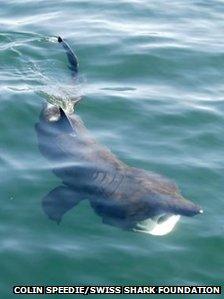Basking sharks off Hebrides to be tagged and tracked
- Published

Basking sharks off Coll and Tiree will be satellite tagged
Scientists are to attach satellite tags to 20 basking sharks in an effort to better understand how the fish behave in the sea between Skye and Mull.
Marine biologists will tag sharks found in the waters around Coll, Tiree and Hyskeir, a group of rocky islets near Canna.
Scottish Natural Heritage (SNH) and the University of Exeter will track the fish over several months.
The public will also be able to monitor the sharks' behaviour via a website.
The scientists said the project would provide information on the location and behaviour of basking sharks during the summer, and also track how far into deeper water they go in winter.
Project manager Dr Suz Henderson, from SNH, said the sharks visited Scottish waters every summer.
She said: "We want to know how the sharks use the waters between Skye and Mull and how long they remain in the area.
"We'd also like to find out how important this area is in the life cycle of the sharks, and if some areas are used more than others. The results from this project will help to answer these questions."
Dr Henderson added: "In addition an area between Skye and Mull has recently been identified as a place where it might be appropriate to develop a marine protected area to protect basking sharks.
"The tagging work will help determine if an MPA is an appropriate way to safeguard these magnificent animals."
SNH said the study area overlapped a site of a proposed offshore wind farm west of Tiree, known as the <link> <caption>Argyll Array</caption> <altText>Link to information on Argyll Array</altText> <url href="http://www.argyllarray.com/about.asp" platform="highweb"/> </link> .
The agency said the tagging project would provide information about the use of this area by the sharks.
Dr Matthew Witt, of the University of Exeter, said relatively little was known about how basking sharks live.
He said: "This project will use some of the newest animal tracking technology available for marine species that allows us to know where the sharks are with near GPS accuracy.
"This is a hugely challenging project - not least because we are at the mercy of the weather and sea conditions - but the results will prove invaluable in our quest to uncover the secrets of these giants of the sea and help to protect them."
The tags, which are attached to the sharks using titanium darts and darting poles, will record information on the movement of the sharks, including depth and water temperature.
After several months, the tags will detach from the animals and could be washed on beaches.
Once the sharks are tagged, information on their movements will be available online at <link> <caption>http://www.snh.gov.uk/about-scotlands-nature/species/fish/sea-fish/shark-tagging-project/</caption> <altText>Link to SNH basking shark website</altText> <url href="http://www.snh.gov.uk/about-scotlands-nature/species/fish/sea-fish/shark-tagging-project/" platform="highweb"/> </link> .
- Published30 April 2012
- Published21 February 2012